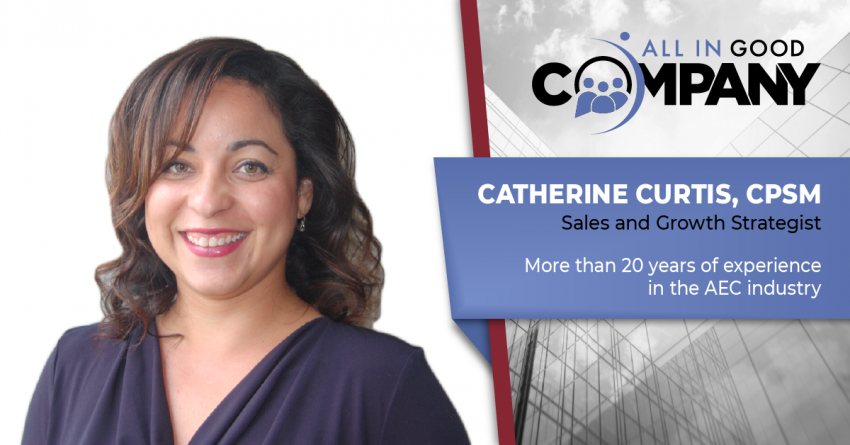As a firm leader, how have you created a marketing mentality in the firm/office?
It's important for the leadership team to focus on solidifying the perception of marketing as an investment and that the investment is most sound when it is backed by solid client relationships and adherence to business development best practices. This mentality is shared at all levels of the organization and drives efforts to position the firm for new work opportunities.
Why do you think marketing in our industry is so important?
Client relationships are the key to winning and successfully delivering projects in our industry. A marketing program that emphasizes and formalizes relationship-building with prospective and existing clients is a critical factor of success. It’s what is necessary to get an edge over the competition and very, very difficult to overcome if not in place.
Is there someone who mentored you about marketing mentality?
I’ve been most inspired by operational, project management, and technical leaders—those who ultimately end up working on the projects we pursue. Their passion for engineering and commitment to client service is what has inspired me to develop and implement marketing approaches that best represent a value proposition at local and national levels. Through various roles, I’ve had the opportunity to work with offices in different locations, and I’m continually impressed by each team’s drive to deliver outstanding client service. I continually encourage marketers in our industry to learn as much as possible about the projects they are pursuing—to strive to truly understand what they are selling so they can better partner with operational teams and work together on pursuit strategy in advance of and during development of procurement responses.
How do you get firm leaders on board for your marketing initiatives?
Before getting on board, firm leaders generally want to understand the reasons for an initiative, what it will entail—including investments—and the anticipated benefit. Marketers are fundamentally communicators and therefore have an incredibly valuable skillset to articulate all of these elements to firm leaders. They can impact change in whatever role they serve. For example, within my first few years of being a marketing coordinator, I noted the office I worked for needed to rein in and better focus its pursuit efforts. I made a case for this by pulling together win rate and revenue captured data. I analyzed marketing efforts for individual seller-doers to see who was getting the most traction. The data was compelling and motivated change.
How do you show ROI of the marketing program to other firm leaders?
This is more nuanced than other KPIs because it’s not just the win rate that matters. An increase in average contract values, for example, is a metric I far prefer to the win rate. Qualitatively, we also need to look at the types of projects we’re winning. How well do they align with office- and firm-strategic objectives? How excited are our employees about the work? Do the projects have clients that have robust programs we can continue to benefit from for several years? These and many other factors need to be considered to assess marketing program success at the operational level.
How do you get non‐marketing staff involved in/excited about supporting marketing efforts?
We’re in a technical industry with professionals who represent a wide range of skillsets and desires. It is neither realistic or beneficial to force everyone into pursuit strategy or client management. That being said, marketing takes many forms, and we value individuals who are fully focused on production and quality of deliverables just as much as the rain makers who are more inclined to build client relationships and strategize on pursuits. That’s the key to getting firmwide buy-in for marketing—make it applicable to everyone regardless of role or interest.
What is the best way you have found to get technical staff involved?
Again, it depends on the individual. Someone who wants to focus on project delivery and be the very best at their discipline but struggles to be a client manager can be engaged in marketing by presenting as a subject matter expert or developing a whitepaper with a highly technical focus. That is still a valuable marketing effort for the firm. Those who are looking to be on the front end of business development often just need direction. Give them a focused list of clients and contacts to focus on, clearly lay out expectations for their role, then let them follow through. I don’t like to classify all technical staff as a particular type. They are people with different personalities and aspirations. Part of the fun is getting to know them and helping each individual determine where they best fit into the marketing process.
What are three tips you give your marketing coordinators to help them progress and evolve in their role?
Number 1, learn what you are selling. This is just so critical not only to be effective at our jobs, but also to earn respect and trust from our technical partners. Don’t set a hard line between marketing and technical. Marketers who come to the table expecting technical teams to abide by marketing best practices without setting an expectation from themselves to understand the intricacies of a technical field will struggle to gain credibility and ultimately end up focusing more on process than a collective effort to capture a win.
Number 2, embrace challenges as growth opportunities. It’s incredibly satisfying to see behavioral and cultural changes that result when we decide to tackle systemic issues that are not serving us.
Number 3, if you’re going to be an agent of change, build strong relationships with operational managers. They are going to be your best ally, and you will rely on them heavily to address issues or friction that will invariably come up.
What marketing‐related training do you advise within a company?
I advise developing several in-house training programs focused on business development for various levels of experience. Training programs that are intentionally developed to be administered by marketing managers empowers them to tailor the training to further to fit regional or more local dynamics. This also supports their role as marketing leaders and subject matter experts. For the marketing team, I advise developing a comprehensive handbook that supports your structure, but also encourage training through SMPS, APMP, WTS, and other organizations.
How an a marketing team interact with a business development team?
Even with a centralized the firm’s marketing staff in one department, maintain geographic assignments to provide marketing team members with the best opportunity to immerse themselves in knowledge of specific clients and operational teams. That's different from a massive team that only has a surface level understanding of each area. A regional structure encourages our marketers to dig deeper into the dynamics of their assigned areas and, with a greater understanding of what those are, provide valuable insight that supports pursuit strategies.
What are the biggest hurdles your team/office/firm faces related to marketing?
Every firm is facing a severe shortage of marketers with industry experience compared to need. We recognize this is not changing any time soon and are revising our recruitment and training approaches to make room for individuals who are coming into the industry for the first time.
What are ways your marketing could improve or reach the next level?
The three tips previously mentioned will help any individual advance to the next level. In my opinion, the main issue of the day isn’t so much advancement as it is retention. I believe our industry provides many opportunities for marketers to develop new skills or expand their knowledge base if the individual is inclined to do so. Collectively, firm leaders need to focus on retaining and recognizing the marketing talent they have, in addition to recruitment. Marketing team leaders in particular need to keep team members engaged and excited to work with one another and their pursuit teams. That’s the key to retention, particularly as more of our workforce is remote. Great marketers with industry experience are harder and harder to find, and we value their efforts whether they work in an office environment or a remote location that is better suited to their personal lives. But this intensifies the need to proactively keep everyone engaged through various means, so they feel part of a larger team they want to stick with in the long-run.






